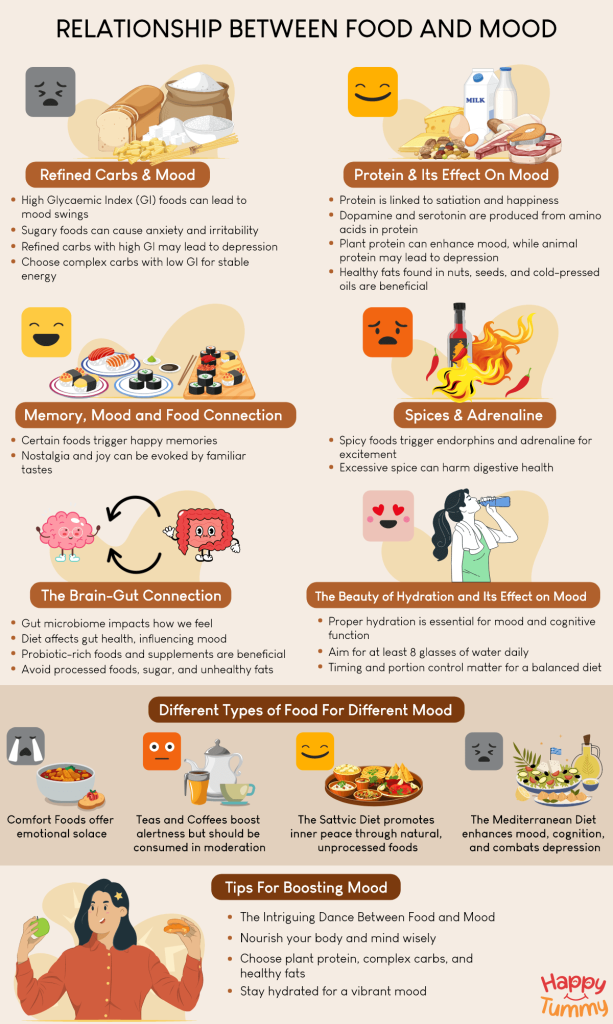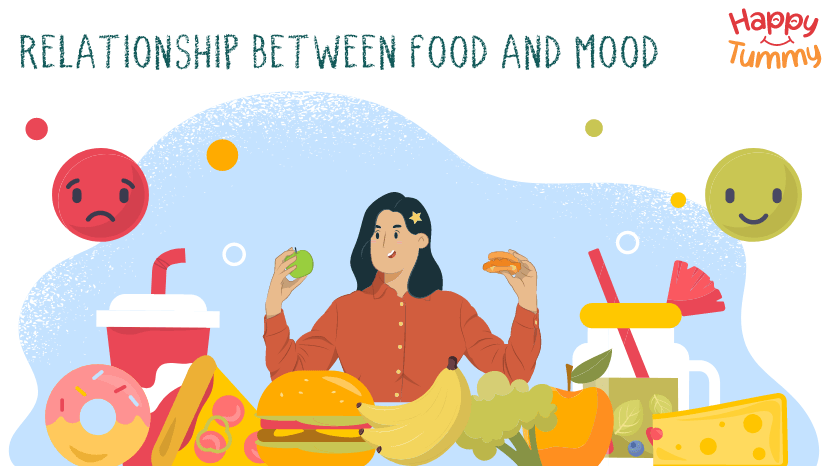Table of Contents
Ever wondered why a piece of dark chocolate brings us happiness? Or that extra spicy kebab setting everything on fire?
Why do people eating sattvic food seem to float on a cloud of peace and bliss?
Or why a sip of caffeine brings us to that state of alertness?
It is because food moves our mood. It causes moods to swing to their extremes. Quite more than what we believe.
Food has this tremendous ability to tune our emotions and shift our gears. But why should you be armed with this knowledge?
Utterly simple – so that you nourish your body with the right food and don’t stress it unnecessarily; so that you know why you are feeling stressed or where the joy has come from. Let’s get it swinging.

The Mood and the Refined Carbs
You might have observed that farmers who work in the fields eat so much rice. It is because rice provides them with the simplest form of energy. But then there comes the highly refined carbs or our beloved sugars. They have a high Glycaemic Index.
Now, A GI (or Glycaemic Index) is a number that tells the rate at which carbs are digested, absorbed, and utilised for energy. The higher the GI, the worse the carb is for our health. Why? Because carbs that suddenly load out blood with glucose raise our blood sugar levels.
Sugary foods can give your mood a rollercoaster ride. As a result, they can sag you with anxiety and irritability. Not only this, studies say that refined carbs with high GI can make you depressed too. [1]
The takeaway:
Although sugary delights and refined carbs might seem alluring, they hold devils inside.
Choose complex carbs with a low Glycaemic Index
These carbs release energy slowly into your bloodstream. Consequently, your blood sugar levels and BP remain balanced.
Studies have found that complex carbs lead to the release of serotonin, our feel-good hormones. So, consume them, but with a good mix of proteins and healthy fats.
Here are a few examples of complex carbs:
- Fruits
- Veggies
- Eggs
- Cheese
- Nuts and seeds
- Turkey, Salmon, etc.
Protein and Pleasure– What is the relation?
Protein, the building block of life, is also the building block of happiness. Their intake leads to satiation and a sense of happiness. This is because dopamine and serotonin are made using the amino acids found in protein. [2]
However, where plant protein can lead to happiness, intake of animal protein has been found to be sagging one down with depression. [3]
The same stands true with healthy fats found in nuts, seeds, or cold-pressed oils. Avoid junk and processed food, trans-fat, saturated fat, refined oil, etc.
The Brain-Gut Connection
Human gut homes billions to trillions of bacteria. These bacteria help digest food and provide us with essential nutrition. This whole community is called as microbiome. And believe it or not, their number impacts the way we feel.
The gut and the brain chat with each other. They use pathways like nerves, inflammation signals, and hormones to have a two-way conversation.
When people with depressive symptoms were studied, they were found to have an altered gut microbiome. And know what happened when their microbiome got infused in animals? They showed depressive symptoms too. [4]
The takeaway:
What we eat alters our gut microbiome. The better their number, the healthier they are, the higher we feel.
Where a diet heavy in processed foods, sugar, and unhealthy fats can lead to a “leaky gut; a diet high in fibre, antioxidants, and unsaturated fats can nourish your gut bacteria. [5]
- Eat foods high in probiotic
- Take probiotics in supplement form
- Fermented foods help guts
- Avoid junk food that has no nutritional value
The Memory and Mood Connection
While surely foods impact our mood based on their nature, sometimes we form a special relation to certain foods. For example, one might have a special and happy memory related to biryani from your childhood. So when the person eats that same taste again, s/he might feel deeply nostalgic and joyful again. This state of elation comes irrespective of the nature of food.
Spices and Adrenaline
Hot curries, that furious kebab, or the peppery punch of pani puri, all these spicy delights trigger the release of endorphins and adrenaline. It leads to a sense of excitement and a natural high. If you feel like enjoying this fight-or-flight kick, give it a go. Just know that too much spice can harm your digestive system and health.
The Different Types of Food
Now, as human culture grew over these past few thousand years, we developed a sense of cuisine according to their impact. This is why you might hear about different types of diets across the world. We’ll guide you through a few:
1. Comfort Foods
When times turn troublesome, many seek solace in food. This helps us cope with the saddened state. For example, a bowl of warm chicken soup, macaroni and cheese, or a slice of homemade apple pie can evoke a sense of nostalgia and cuddle you with emotional comfort. For a lot of Indians like me, we have our simple dal-chawal, kadhi-chawal, khichdi, rasam-ice and maach-bhaat.
Well, we should be proud of the rich food heritage that gives us so many options in food.
2. Teas and Coffees
Caffeinated beverages like coffee and tea improve alertness and concentration. You might notice that you suddenly feel energetic after having a cup of coffee. You may drink it for its own set of benefits. However, coffee has a downside too. Too much of it is harmful to your body. Also, over time, you might need to drink more cups to get that same old kick.
3. The Sattvic Diet
Sattvic diet isn’t about just filling your stomach; it’s about feeding your soul and finding inner peace. Fresh fruits, vegetables, whole grains, nuts, seeds, all these natural delicacies take centre stage in this. What’s different here? That it asks you to avoid spicy and processed food. Go all natural and nature will infuse a sense of calm within you.
4. The Mediterranean Diet
Mediterranean diet can be considered as a sibling to the Sattvic diet. It embraces the consumption of fruits, vegetables, whole grains, olive oil, and lean proteins. The purpose? To improve cognition and mood, and alleviate depression. And studies prove it well. [6]
5. The Beauty of Hydration
Our body is composed mostly of water. Not only does it help bring a state of sanity to us, but it also lifts our mood. Proper hydration has been linked to better cognitive abilities and satiation. Furthermore, hydration enhances immunity too. So grab a glass of water and gulp it down if you recently haven’t.
Aim for at least 8 glasses of water a day.
Is this all? Almost, just the timing of the day and the hunger levels.
Eat a good, healthy, and balanced breakfast. It sets the tone of the day.
Don’t overeat. Aim for 80% of your stomach.
Also, eat more meals of light food rather than few meals with heavy one.
Conclusion
So, there you have it – the intriguing dance between food and mood. From the joy of a piece of dark chocolate to the fiery enthusiasm of spicy kebabs, food is mood. What we eat ‘does’ take our emotions on quite the rollercoaster ride.
Knowing how food influences our moods can help us nourish our bodies and minds wisely.
Remember, there’s a lot more to your plate than just flavours. Where plant protein, complex carbs, and healthy fats lead to a sense of joy, animal protein, refined carbs, and unhealthy fats do otherwise. Just don’t forget to keep drinking water and hydrate yourself.
Cheers to happy eating and a mood that’s as vibrant as your meal!
Certain nutrients in food, such as amino acids, vitamins, and minerals, play a crucial role in the production of neurotransmitters (chemical messengers in the brain) that affect mood.
For example, foods rich in tryptophan can help increase serotonin levels, which can improve mood. The balance of blood sugar levels can also influence mood.
Consuming a diet high in processed foods and sugar can lead to mood swings and irritability. A balanced diet with a variety of nutrients is essential for maintaining good mental health and stable moods.
Foods that are good for stabilizing mood swings include:
• Antioxidant-rich fruits and vegetables.
• Complex carbohydrates like whole grains, can help stabilize blood sugar levels.
• Dark leafy greens and other sources of folate.
• Fatty fish (salmon, mackerel) rich in Omega-3 fatty acids.
• Foods high in tryptophan, such as turkey, chicken, and bananas.
• Nuts and seeds, high in magnesium and zinc.
You can manage your mood with food by:
• Antioxidant-rich fruits and vegetables.
• Complex carbohydrates like whole grains, can help stabilize blood sugar levels.
• Dark leafy greens and other sources of folate.
• Fatty fish (salmon, mackerel) rich in Omega-3 fatty acids.
• Foods high in tryptophan, such as turkey, chicken, and bananas.
• Nuts and seeds, high in magnesium and zinc.
Fruits high in antioxidants, such as blueberries, strawberries, and oranges, can help improve mood by reducing oxidative stress and inflammation in the brain.
Bananas contain tryptophan, which can contribute to the production of serotonin, a neurotransmitter associated with a positive mood.
While there’s no specific fruit that directly reduces anger, consuming a balanced diet with fruits and vegetables rich in antioxidants and essential nutrients can help regulate emotions and potentially reduce feelings of anger and irritability.
Deep breathing exercises and stress management techniques can also be effective in managing anger.
To boost your mood daily, you can:
• Eat a balanced diet with nutrient-rich foods.
• Get enough sleep to support mental well-being.
• Get regular exercise, as it releases endorphins that improve mood.
• Maintain social connections and engage in enjoyable activities.
• Practice stress-reduction techniques like meditation or deep breathing.
• Seek professional help if you’re struggling with persistent mood issues.















